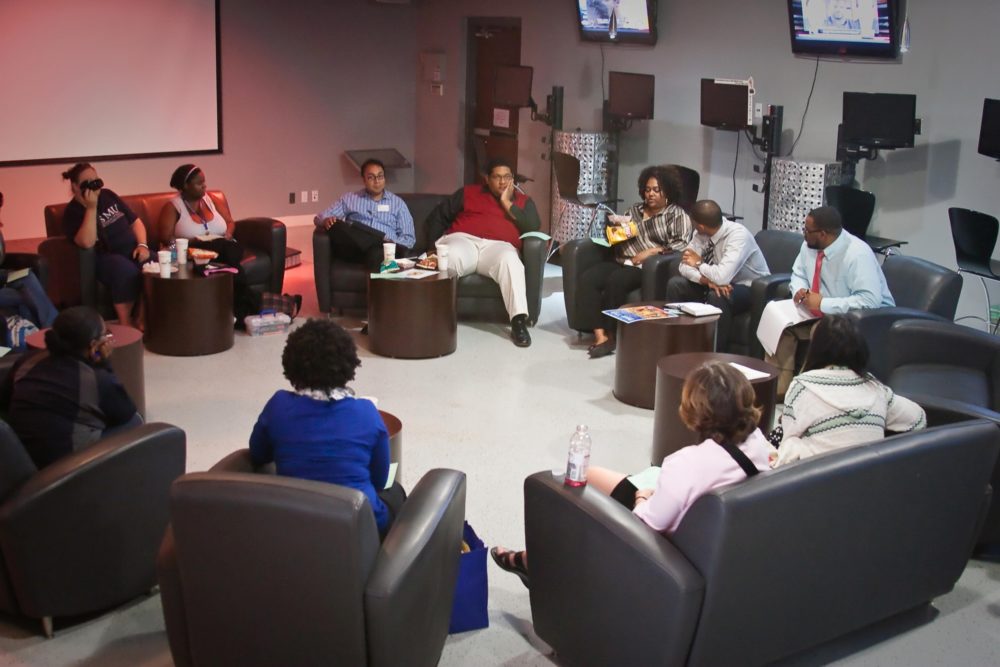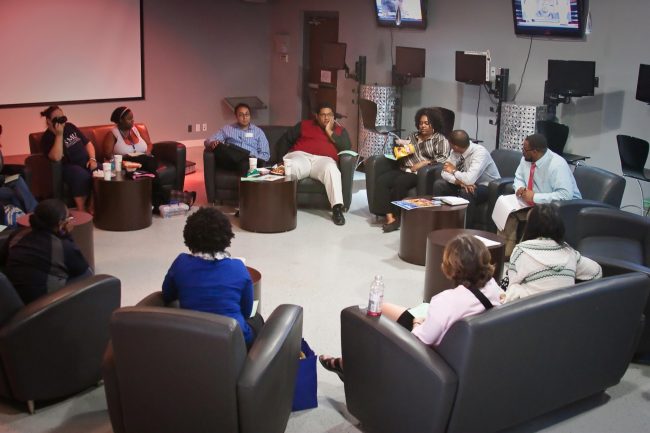
SMU students and faculty discuss the consequences of reality television shows in the M longue Thursday afternoon. (Spencer J Eggers/The Daily Campus)
Reality television shows like “Khloe and Lamar,” “Basketball Wives,” “The Bachelor” or “First 48” have made huge waves across television channels since the early 2000s, ousting scripted shows like “One Life to Live” and “All My Children” off the air.
Since reality TV’s universal takeover, people have questioned the messages some reality shows are sending and the impact it is making on younger audiences.
The Multicultural and Student Affairs Department decided to tackle this topic by hosting a forum Thursday. in the M Lounge asking students how reality TV has made its mark on their lives.
“We wanted to create and establish a dialogue on campus and get people talking,” said Creston Lynch, the new Multicultural and Student Affairs Director. “We felt reality TV is something everyone could relate to.”
Real Talk: Reality TV is one of a number of series the Multicultural Student Affairs Department is hoping to host to get students involved and become aware of issues like gender and sexual orientation and cultural differences.
“We’re hoping this dialogue will be one of many that will allow different people from different backgrounds to hear different perspectives,” said Lynch.
To kickoff the forum Lynch posed a question: “Is reality TV a guilty pleasure, innocent fun or does it promote stereotypes?”
Like many of the attendee’s, Associate Director of Student Life Elsie Umeh believes reality TV does glamorize stereotypes, but she is not fooled by the messages they convey.
“It definitely perpetuates stereotypes, but we still watch. I mean I watch,” Umeh said. “For me it is a guilty pleasure, but I’m also an informed consumer, which means I know what I’m watching doesn’t speak for any community as a whole.”
Some of the students attending, like senior mechanical engineering major Noura Liben, felt the shows were definitely attention grabbers, but the messages glamorized celebrity lifestyles ,like Kim Kardashian, whose claim to fame places education in the rear.
“We all kind of look up to these shows that promote partying and having money. This glorified celebrity life, the fast life,” Liben said. “We promote this lifestyle so much that being college educated isn’t cool anymore.”
As most of reality TV’s stand out shows portray negative stereotypes, students did not forget to mention positive shows making a difference in the world, like Extreme Makeover and Intervention.
They were just as popular, but not as many.
First-year marketing major Riane Alexander dedicated the lack of balance to the public.
“The majority of people want to watch these staged-reality shows, Alexander said. “They have huge followings and unfortunately overshadow positive shows.”
As the conversation continued and opinions were expressed, Lynch posed an additional question as to how knowing these shows create negative stereotypes could remain so popular and what they as consumers could do to help reverse these glamorized stereotypes?
“It starts at home, with education,” Alexander said.
She continued by expressing that some of the stereotypes emphasized on these shows send unwavering racial undertones that do not sit well with her.
“I despise when people say I talk white,” Alexander said. “It sends a negative connotation that because I’m from South Dallas there is a certain way I’m supposed to talk and carry myself.”
Umeh agreed with Alexander that the massive followings of these shows and trying to fight the negative stereotypes they portray could make anyone feel defeated and helpless. She also feels the conversation is necessary.
“Educating people on stereotypes can be tiring, but if it’s something that’s really important to you, then it’s something that I would really encourage,” Umeh said.
Graduate library studies major Michele Mrak had another solution to these perpetuated stereotypes included in regular television programming rotations.
“I suggest getting out and socializing with people,” Mrak said. “They have a saying…we watch so much TV because we’re not out their living our own lives.”









